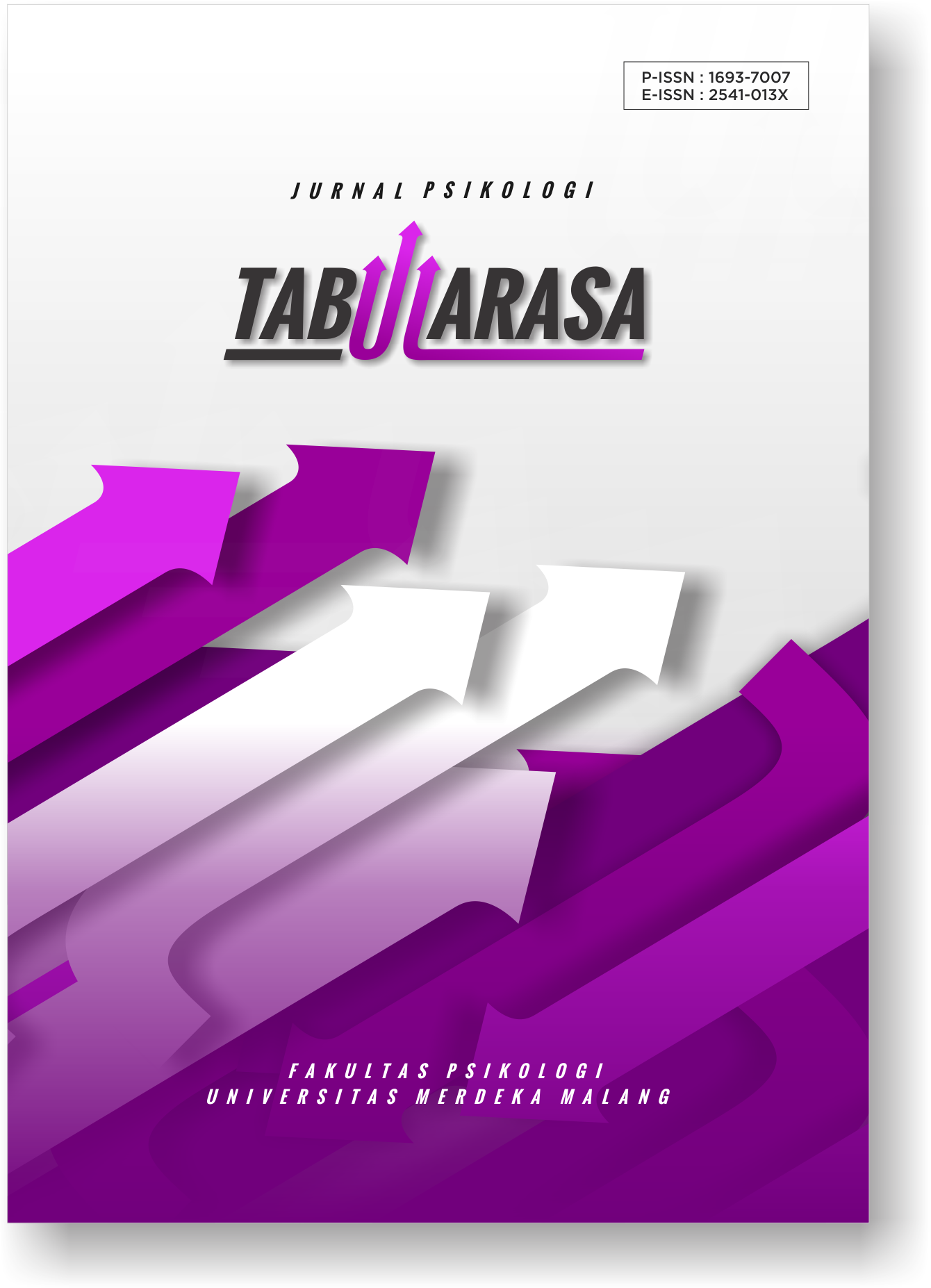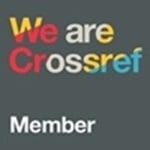The effectiveness of expressive writing on students’ subjective well-being
DOI:
https://doi.org/10.26905/jpt.v19i2.13980Keywords:
Expressive writing, Kesejahteraan Subjektif, MahasiswaAbstract
ABSTRACT
Writing can serve as a means for individuals to express their feelings or internal meanings. This study aims to determine whether there the expressive writing has an impact on the subjective wellbeing of students. This study employed a true experimental design using the Pretest Post-test Control Group Design. The participants consisted of 22 new students from the 2023 academic year, selected using convenience sampling techniques. Data were collected the Oxford Happiness Questionnaire (OHQ) and analyzed using the Independent Sample T-Test. The results of the data analysis indicated no significant different in subjective-well being scores between the experimental group (EG) and the control group (CG) (p = 0.700, p > 0.05)). This suggests that expressive writing does not influence the subjective well-being of students. The implementation of the intervention (expressive writing) was carried out when students were taking final semester exams which potentially disrupts their concentration and focus, hindering their ability to fully express their feelings or experiences in writing. Therefore, to ensure the effectiveness of the intervention, it is important to consider the participants’ conditions.
ABSTRACT
Menulis dapat menjadi sarana untuk mengekspresikan perasaan atau makna yang ada pada dirinya individu. Penelitian ini bertujuan untuk mengetahui apakah terdapat pengaruh expressive writing terhadap kesejahteraan subjektif mahasiswa. Penelitian ini merupakan penelitian eksperimen murni (true experiment) dengan desain Pretest Post-test Control Group Design. Partisipan penelitian ini adalah mahasiswa baru angkatan 2023, sebanyak 22 orang, diperoleh dengan teknik convenience sampling. Pengumpulan data menggunakan Oxford Happiness Questionnaire (OHQ). Data yang diperoleh kemudian dianalisis dengan Independent Sample T-Test. Hasil analisis data menunjukkan tidak terdapat perbedaan yang signifikan skor SWB antara kelompok eksperimen (KE) dan kelompok kontrol (KK) (p= 0,700, p > 0,05). Hal tersebut menunjukkan bahwa expressive writing tidak berpengaruh terhadap kesejahteraan subjektif mahasiswa. Pelaksanaan intervensi expressive writing yang dilakukan di saat mahasiswa menjalani ujian akhir semester membuat konsentrasi partisipan terganggu dan kurang fokus dalam menuliskan apa yang dirasakan atau dialaminya. Oleh karena itu agar hasil intervensi berpengaruh perlu diperhatikan kondisi partisipannya.
Downloads
References
Arnett, J. J. (2018). Adolescence and Emerging Adulthood: A Cultural Approach (Vol. 6).
Arslan, G., & Coşkun, M. (2020). Student subjective wellbeing, school functioning, and psychological adjustment in high school adolescents: A latent variable analysis. Journal of Positive School Psychology, 4(2), 153–164. https://doi.org/10.47602/jpsp.v4i2.231
Azzahra, A. (2020). Pengaruh menulis ekspresif terhadap tinggat stres mahasiswa. Jurnal Psikologi, 1(1). https://doi.org/10.31234/OSF.IO/CBMF7
Bistolen, J., & Setianingrum, M. E. (2019). Hubungan antara self efficacy dengan subjective well being pada mahasiswa baru di etnis timur (ikmasti) di salatiga. Jurnal Basicedu, 4(1), 103–109. https://doi.org/10.31004/basicedu.v4i1.284
Cayubit, R. F. O. (2021). Effect of Expressive Writing on the Subjective Well-Being of University Students. Makara Human Behavior Studies in Asia, 25(1), 71–79. https://doi.org/10.7454/hubs.asia.1130520
Chaeruman, D. R. D., Nabila, F. I., Choli, J., & Purwantini, L. (2024). Hubungan Dukungan Sosial Dan Self Esteem Dengan Subjective Well Being Pada Mahasiswa Universitas Islam “45†Bekasi. Jurnal Pendidikan Dan Ilmu Sosial, 2(2), 194–205. https://doi.org/10.54066/JUPENDIS.V2I2.1535
Dibbets, B. (2021). Writing as a Form of Therapy: Increasing Subjective Well-Being by Writing About Positive, Negative and Neutral Experiences [Tillburg University]. https://doi.org/10.408
Doherty, J. H., & Wenderoth, M. P. (2017). Implementing an Expressive Writing Intervention for Test Anxiety in a Large College Course. Journal of Microbiology & Biology Education, 18(2). https://doi.org/10.1128/jmbe.v18i2.1307
Julika, S., & Setiyawati, D. (2019). Hubungan antara kecerdasan emosional, stres akademik, dan kesejahteraan subjektif pada mahasiswa. Gadjah Mada Journal of Psychology (GamaJoP), 5(1), 50. https://doi.org/10.22146/gamajop.47966
Hamdan, S. R. (2016). Happiness: Psikologi Positif Versus Psikologi Islam. UNISIA, 38(84). https://journal.uii.ac.id/Unisia/article/view/11661/8737
Knowles, E. D., Wearing, J. R., & Campos, B. (2011). Culture and the health benefits of expressive writing. Social Psychological and Personality Science, 2(4), 408–415. https://doi.org/10.1177/1948550610395780
Kristina, K. (2022). Dampak menulis ekspresif terhadap tingkat stres, kecemasan, depresi pada mahasiswa keperawatan, Sebatik, 26(1), 66–72. https://doi.org/10.46984/sebatik.v26i1.1663
Kurniawan, S. R., & Eva, N. (2020). Hubungan antara dukungan sosial dengan kesejahteraan psikologis pada mahasiswa rantau. Seminar Nasional Psikologi Dan Ilmu Humaniora (SENAPIH), 1(1). http://conference.um.ac.id/index.php/psi/article/view/28
Mawaddah, I., Astuti, N. W., & Wijaya, E. (2022). Hubungan stres akademik dengan subjective well-being pada mahasiswa selama masa pandemi Covid-19. PROSIDING SERINA, 2(1), 363–372. https://doi.org/10.24912/PSERINA.V2I1.18552
Mianti, R., Hasanuddin, H., & Dewi, S. S. (2024). The effect of expressive writing therapy on self-efficacy and subjective well-being students. Journal La Sociale, 5(2), 309–317. https://doi.org/10.37899/journal-la-sociale.v5i2.1068
Nakamura, J. S., Delaney, S. W., Diener, E., VanderWeele, T. J., & Kim, E. S. (2022). Are all domains of life satisfaction equal? Differential associations with health and well-being in older adults. Quality of Life Research, 31(4), 1043–1056. https://doi.org/10.1007/s11136-021-02977-0
Neuman, W. L. (2014). Social Research Methods: Qualitative and Quantitative Approaches. In W. L. Neuman (Ed.), Social research methods : qualitative and quantitative approaches. Pearson. https://books.google.com/books/about/Social_Research_Methods.html?hl=id&id=Ybn3ngEACAAJ
Robertson, S. M. C., Short, S. D., Sawyer, L., & Sweazy, S. (2021). Randomized controlled trial assessing the efficacy of expressive writing in reducing anxiety in first-year college students: the role of linguistic features. Psychology & Health, 36(9), 1041–1065. https://doi.org/10.1080/08870446.2020.1827146
Syafitri, D. U., Laksmiwati, A. A., & Aziz, A. A. (2021). Terapi menulis ekspresif berbasis online untuk meningkatkan kesejahteraan psikologis mahasiswa fakultas psikologi Unissula. Intuisi: Jurnal Psikologi Ilmiah, 13(1), 83–99. https://journal.unnes.ac.id/nju/INTUISI/article/view/26388
Tonarelli, A., Cosentino, C., Artioli, D., Borciani, S., Camurri, E., Colombo, B., D’Errico, A., Lelli, L., Lodini, L., & Artioli, G. (2017). Expressive writing. A tool to help health workers. Research project on the benefits of expressive writing. Acta Bio-Medica : Atenei Parmensis, 88(5S), 13–21. https://doi.org/10.23750/ABM.V88I5-S.6877
Victoriana, E., Manurung, R. T., Azizah, E., Teresa, M., & Gultom, Z. A. (2023). Makna hidup dan subjective well-being mahasiswa. Humanitas (Jurnal Psikologi), 7(2), 225–244. https://doi.org/10.28932/humanitas.v7i2.6544
Wahyuningtyas, A., & Setiowati, E. A. (2020). Menulis Ekspresif untuk Meningkatkan Kesejahteraan Psikologis Mahasiswa. Psisula: Prosiding Berkala Psikologi, 2. https://doi.org/http://dx.doi.org/10.30659/psisula.v2i0.13063
Wu, C., & Yao, G. (2006). Analysis of factorial invariance across gender in the Taiwan version of the Satisfaction with Life Scale. Personality and Individual Differences, 40(6), 1259–1268. https://doi.org/10.1016/j.paid.2005.11.012
Yuwanto, L. (2019). Metode Penelitian Eksperimen (2nd ed.). Graha Ilmu. https://balaiyanpus.jogjaprov.go.id/opac/detail-opac?id=311633
Downloads
Published
How to Cite
Issue
Section
License

This work is licensed under a Creative Commons Attribution-ShareAlike 4.0 International License.




